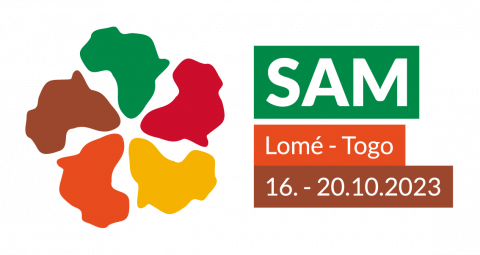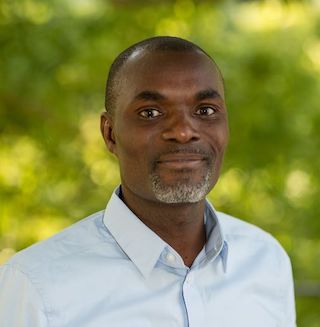 A seat next to Kwashie Agbitor (pictured below) was one of the most highly sought-after spots at SAM 2023 in Togo in October. Mr Agbitor has 20 years of experience in Africa and Asia, improving branch operations, credit appraisals, risk management, methodology auditing, product development, client protection and social performance management.
A seat next to Kwashie Agbitor (pictured below) was one of the most highly sought-after spots at SAM 2023 in Togo in October. Mr Agbitor has 20 years of experience in Africa and Asia, improving branch operations, credit appraisals, risk management, methodology auditing, product development, client protection and social performance management.
At SAM 2023, Mr Agbitor moderated a discussion titled “Climate funds, an opportunity for financial institutions to scale up sustainable and inclusive financing.” The panelists represented the Tunisian microfinance institution (MFI) Enda Tamweel, the Belgian impact investment firm Incofin, the Kenyan microlender Juhudi Kilimo and the French impact investor Solidarité Internationale pour le Développement et l’Investissement (SIDI).
Bob Summers: How can financial services providers (FSPs) work with climate funds to expand their green lending portfolios?
 Kwashie Agbitor: There are numerous opportunities for financial institutions to build their green portfolios with climate funds. Financial institutions can leverage equity, debt and quasi-equity sources of funding from various types of organizations. Climate funds can be used to develop and deploy financial services that support the adoption of green products/solutions and help people recover from climate-related shocks. Given their nature, most climate funders also provide technical support/assistance in addition to funding.
Kwashie Agbitor: There are numerous opportunities for financial institutions to build their green portfolios with climate funds. Financial institutions can leverage equity, debt and quasi-equity sources of funding from various types of organizations. Climate funds can be used to develop and deploy financial services that support the adoption of green products/solutions and help people recover from climate-related shocks. Given their nature, most climate funders also provide technical support/assistance in addition to funding.
BS: What factors influence whether a climate fund would invest in a particular MFI?
KA: Firstly, the MFI and the investor must “speak the same language” in order to establish a partnership that will achieve the desired results. The MFI must not only have the strategy, but also have buy-in from all of its key stakeholders. Meanwhile, MFIs that have the right products and human resources are most likely to attract climate funds.
BS: What indicates that an MFI is ready to leverage climate finance?
KA: In order to leverage climate funds, MFIs need to show an understanding of these funds and have created or at least have the basic conditions in place to create financial services and products that align with climate objectives. Climate funds tend to have strict compliance and reporting requirements, so MFIs have to show that they have sufficient internal capacity to meet these expectations. Additionally, MFIs must be willing to partner actively with other stakeholders.
BS: Can you offer an example of a business case likely to attract funding to launch a green product?
KA: Beyond the financial considerations, the green product must have a strong link with climate-related objectives such increasing the adoption of green technologies and practices, increasing resilience to climate change, mitigating negative impacts on the environment, and fostering sustainability.
Mr Agbitor serves as Senior Manager – Risk Management & Operations at the US-based NGO Accion. As part of the organization’s Global Advisory team, he supports inclusive finance institutions in reimagining their risk and operations processes. For example, he has been working recently with FSPs in Uganda, Nigeria, Kenya, Ethiopia and Mozambique to develop integrated financial and non-financial services. His experience spans traditional and digital financial services targeting actors in agricultural value chains as well as micro-, small and medium-sized enterprises in other sectors. Mr Agbitor holds an Executive MBA in Project Management from the University of Ghana Business School and an MA in Sustainable Finance with a specialty in Development Finance from Frankfurt School of Finance and Management.
Accion is a global nonprofit on a mission to create a fair and inclusive economy for the nearly 2 billion people who are failed by the global financial system. We develop and scale responsible digital financial solutions for small business owners, smallholder farmers and women, so they can make informed decisions and improve their lives. Through targeted investment strategies, advisory and expert thought leadership, we work with local partners to develop and scale cheaper, more accessible and customer-friendly financial solutions. Since 1961, Accion has helped build more than 230 financial services providers serving low-income clients in 75 countries, reaching more than 350 million people. More at https://www.accion.org.
Bob Summers has been reporting news on impact investing since 2006.
This feature is part of a sponsored series following October’s African Microfinance Week (SAM 2023). SAM is organized by ADA and the Microfinance African Institutions Network with the support of the Directorate for Development Cooperation and Humanitarian Affairs of Luxembourg and the government of the event’s host country, which rotates each time the event takes place. The next SAM is scheduled for 2025. Bob Summers has been engaged to promote SAM since 2015.
Similar Posts:
- SPECIAL REPORT: e-MFP Green Inclusive and Climate Smart Finance Action Group Focuses on Capacity Building
- SPECIAL REPORT: Green Action Group Celebrates 10th Anniversary at European Microfinance Week #EMW2023
- MICROFINANCE PAPER WRAP-UP: “State of the Art of Green Inclusive Finance 2011-2019: Worldwide Status and Progress Over 10 Years,” by e-MFP Green Inclusive and Climate Smart Finance Action Group
- MICROCAPITAL BRIEF: Online Today in Spanish, November 22 in French – JuST Institute Announcing Mentoring Program for MFIs Embracing Biodiversity, Climate Adaptation
- MICROFINANCE EVENT: European Microfinance Week; November 15-17, 2023; Luxembourg
